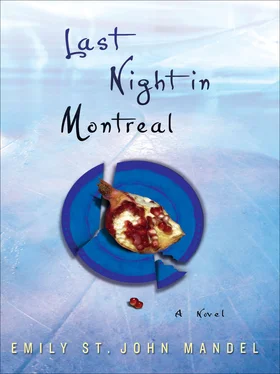“The question,” Zed remarked, “is what you’re going to do now.”
Zed wasn’t staying much longer. He was going back to Africa for a few weeks, and after that he was making plans to go to Europe; he wanted, he said, to sit where the oracle had sat at Delphi. He wanted Eli to come with him. They had halfhearted arguments on whether there was still an oracle there; Eli thought there might be. Zed tended toward the school of thought that all of us are oracles but was inclined to believe that this particular one no longer walked the earth.
“I want to travel.”
“I meant after Greece. After our trip. Are you going back to Brooklyn?”
“To Brooklyn? No, I don’t think so.”
“Why not?”
“Because nothing I did there meant anything,” Eli said. “Because I was ice-skating in that life as much as she was, I do have friends there, but I think I’d rather be. .” He hesitated, looking at a solitary man walking into the park, his coat dark against the snowy path, and he pressed his fingertips against the glass. “I haven’t been outside in a while,” he said. “I’d like to immerse myself in all that.”
“In all what?”
“I’d like to immerse myself in the world. That was her problem,” Eli said. “She couldn’t immerse herself. It isn’t enough to observe the world and take pictures of it.” He was quiet for a second and then said, “It isn’t enough to just go ice-skating. Lilia’s metaphor, not mine — she was talking about how she lived. About how you can skate over the surface of the world for your entire life, visiting, leaving, without ever really falling through. But you can’t do that, it isn’t good enough. You have to be able to fall through. You have to be able to sink, to immerse yourself. You can’t just skate over the surface and visit and leave.”
“Some people only know how to skate.”
“How did you find me in Montreal?”
“There was an unmailed letter to me in your jacket pocket.”
“Do you still have it?”
It was in Zed’s pocket; he passed it over to Eli without a word. It was longer than Eli remembered, four or five pages wadded tightly together, and seemed foreign now; the writing was wild and allowed for no margins, words crashing up against the edges of the page:
I wanted to be her north star. I wanted to be her map. I wanted to drink coffee with her in the cafés in the mornings and do things, as you do, as she did, instead of just philosophizing about them and deconstructing their endless Russian-doll layers of meaning. I was alone before I met her. I wanted to disappear with her, and fold her into my life. I wanted to be her compass. I wanted to be her last speaker, her interpreter, her language. I wanted to be her translator, Zed, but none of the languages we knew were the same.
“I don’t even recognize the handwriting,” Eli said.
“Any idea where she went?”
“No idea. She could be anywhere by now. I actually thought I heard her voice on the train platform in Montreal, but I think I was hallucinating.” He was looking at the letter. “This is like a dispatch from a foreign country,” he said. He refolded it carefully and gave it back to Zed. “I mean, technically it is a dispatch from a foreign country, it’s just, I don’t recognize. .”
“The handwriting? The sentiment?”
“Both, actually. Neither.”
“You don’t still wish you could be with her?”
“I think I’d rather be alone,” he said.
On her last morning in Montreal Lilia woke early and lay still for a while under the blankets. She slept fully clothed in those days and wore two pairs of socks to bed, but winter seeped through the windows of her rented room. She rose and showered quickly, shivering, and put on her waitressing uniform. At the Bistro de Porto down the street she fell into the trance of work, cleaning and serving, and in the late afternoon she went back to her room and changed out of the uniform. Out on the street again she wandered for some hours. but it was too cold to take photographs; she didn’t want to take her hands out of her pockets. She walked past Club Electrolite in the early evening, half hoping to catch a glimpse of Michaela again, but there was no one out front. She spent some time in her favorite bookstore, reading a history of New York City in French, and then started home in the gathering night. The cold in Montreal was like nothing she’d experienced; she was wearing three sweaters under her jacket, but none of them were thick enough, and her clenched hands felt like ice in her gloves. She stopped for a while in an all-night coffee shop in Centre-Sud to read the paper, trying to avoid the loneliness of her rented room, and she was just stepping out into the darkness again when her cell phone rang. Only Michaela and her employer knew the number.
“I want you to meet me somewhere,” Michaela said.
“Why?”
“Meet me on the westbound platform at Métro Place-des-Arts. I’ll tell you what you want to know.”
“You’ve said that before. I don’t believe you.”
“I don’t care,” Michaela said. “Meet me there anyway.”
Two hours later Lilia was in a taxi to the airport, staring blankly at the passing night. She flew from Montreal to Rome at three in the morning, Rome chosen because it was the flight leaving soonest when she arrived at the airport that night and she knew how to speak the language. She withdrew the contents of her bank account from an airport ATM and paid for the ticket in cash. She looked out the airplane window into darkness through all of the long transatlantic night, weeping intermittently, and in the early-morning light she disembarked from a taxi in the Piazzo di Popolo. Later she stood on a bridge over the Tiber River and let the three lists fall from her hands: a list of names, ten pages, beginning and ending with Lilia; a list of places, nine pages, beginning and ending with the province of Quebec; a shorter list of words, of phrases, all Eli’s. She had to leave quickly then because a policeman was approaching meaningfully from the Trastevere side of the bridge, apparently having observed her dropping pieces of paper into the Tiber, so she didn’t get to watch the pieces of her old life float away the way she had wanted to.
Lilia walked quickly down the boulevard that ran alongside the river, hands in her pockets in the morning light, and the city foremost in her mind at that moment wasn’t Montreal or New York or even Chicago, but San Diego. A place far back toward the genesis of everything, a version of herself so distant that the memory itself was third-person: Lilia, young and unstable and awakened frequently by nightmares about a car accident in the mountains, prone to weeping in moments of frenzy or disarray. Lilia, sixteen years old and unaware of her own story, still in shock from an accident a month or two before, fervent and always running out of time, arriving in San Diego alone after dark. Her father and Clara had said good-bye in New Mexico and given her money, made her promise to call and write and come back to visit before too much time had passed. San Diego was the first city she’d ever traveled to by herself, they were terrified and knew they couldn’t stop her, and she was shocked by the exhilaration of solo travel. She pressed her forehead against the bus window and watched the landscape passing by, anguished and exultant and perfectly free. In those days she was tightly wound and always ready to cry, and life seemed fraught with an almost unbearable intensity; in the bus on the way to San Diego she saw a dead cat by the side of the highway, recent roadkill, and she burst into hysterical tears.
In the San Diego bus terminal she stood in front of a long line of pay phones, mesmerized by the way they caught the light, trying to remember a certain phone number and failing. She had a guidebook that was supposed to contain every youth hostel in the state of California, and the closest San Diego entry was miles from the bus terminal but she walked there anyway; she moved slowly through the delirious streets in the early evening, pavement still radiating heat from the afternoon sunlight, dance music pounding from slow-moving cars with tinted windows. Her suitcase made her a stranger, so she dropped it into a garbage can as she passed and after that she went on feeling light and infinitely anonymous, much less wary, much less sharp, hands in her pockets and sometimes whistling brief picked-up snatches of tunes that came and went. She passed a gospel church and sat for awhile on the steps in the vertiginous twilight, the church and her soul both swelling with music, and then onward again past a bodega where two small boys lingered in the doorway; they watched her and one said something in Spanish as she passed. She spoke to him in his own language and he smiled, abruptly shy, and she kept on walking in the fading day. In those days she kept the lists in her pocket (languages, names), and it was excellent, the way the folded wads of paper fitted perfectly in her right hand.
Читать дальше












